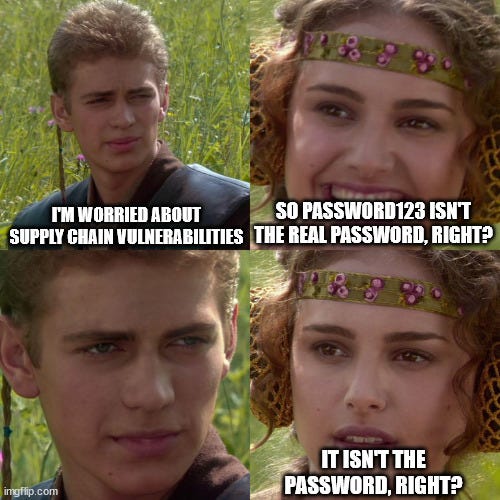Bitcoin Tech Talk #466
Interesting Stuff
Violence, Not Argument - There are a lot of articles opining on what happened with Charlie Kirk this week, but this is the one I found most insightful. As the author notes, the progressives have had a lock on power, through the media, academia, Hollywood and many other institutions for more than a generation now. That combined with the giant benefits of power in a fiat system have led them to hold onto it as long as they can. And doing so has meant that they groom lesser proteges as to prevent competition. And those lesser proteges did the same with their proteges and so on, resulting in people that are very loyal, but terrible at making an argument. They’ve grown lazy and now that they’re losing, they’ve turned to violence as a substitute.
Failing the Vulnerable - The second biggest cultural item from the week is the murder of Iryna Zarutska. You might expect from the title that the article is about protecting people like her, but surprisingly, it’s more about how the current system has not just failed, but massively screwed people like her killer, DeCarlos Brown Jr. As the author notes, there’s a very large minority of people (~100 Million in the US alone) that are getting screwed constantly in fiat systems that exploit them. And they don’t have the intelligence, discipline or awareness to avoid getting screwed. The systems that could have helped prevent this have been regulated out of existence by giant bureaucracies. In other words, it’s a familiar fiat story.
LLM Non-Determinism - Pretty much everyone knows at this point that LLMs are non-deterministic. That is, they give different answers to the same question each time. It’s at least partially by design, so that more creative answers can be given. But it turns out that making LLMs deterministic is not simple at all, even after turning down sources of randomness and this article explores exactly where that source of randomness is. Strangely, it has to do with GPUs and how the work is split up. Complex systems are very hard to understand, even (especially?) the ones that appear to be working well.
Life on Mars - There are some interesting photos from a Mars rover that show mineral traces that are consistent with what dead microbes would leave behind. Apparently, if we had found similar stuff on earth, it would be assumed to have been left behind by some living thing, but because it’s on Mars, there’s an abundance of caution about declaring it a sign of life or anything like that. But given that Mars is remarkably preserved, having very little atmosphere and no plate tectonics, the traces are something we can presumably go study.
Dark Pattern Social Media - The article is about the tricks social media uses to get you addicted, including the many learned from the world of casinos, which are essentially hacks into your brain. In software programming, we call interfaces that ultimately manipulate the user into doing the bidding of the program dark patterns, and social media is full of them. What’s worse, these patterns are being copied by a lot of other non-social media apps, to get people just as addicted. It’s honestly a terrible incentive model as the thing that these social media companies sell is your attention.
What I'm up to
Nostr vlogs - I’ve been posting more of my thoughts on various current issues on Bitcoin, keeping them reasonably short as an exercise in learning to get to the point. I make the argument in these two vlogs that I don’t think Covenants are worth it, and that we really shouldn’t be worried about scaling to 8 billion.
Young America’s Foundation Road to Freedom - I will be speaking at this conference in Raston, VA (alongside Yeonmi Park and EJ Antoni) to a bunch of college students October 3-4. I’ll speak about the trucker protests as a launching point for embracing non-governmental, politically neutral money.
Lugano Plan B Forum - A few weeks later October 24-25, I will be in Lugano for the Plan B Forum. It looks like I may be doing a debate and running a workshop for my open source project, the family Bitcoin banking app.
Nostr Note of the Week
What I’m Promoting
Bitcoin
Cryptography Camp - Jonas Nick has published a wonderful course workbook for learning provable cryptography. It’s part of a 3.5 day class and still a work in progress, but an awesome resource for those that want to learn more about cryptographic proofs with lots of practical exercises. The course looks rigorous with formal definitions, propositions, proofs and a lot of working together.
Javascript Wallet Vulnerability - If you’re using NPM for your software, please be warned that there’s a significant supply chain vulnerability related to some packages published by a user named qix. Apparently, the user’s credentials were compromised and the packages filled with malware to steal user funds. The attack essentially replaces the target address with one from the attacker, and even finds an address that looks the most similar. We’re getting to high enough market caps that this sort of attack will become only more prominent as time goes on.
Mint - This is an open source project that’s something like the OpenDime. The idea is that it’s a bearer instrument where the private key cannot be accessed until a physical circuit is broken, at which point there are indicator lights on the device itself saying so. The idea behind devices like this are cool, but it’s always been a little weird to trust hardware without getting to examine it. But who knows? Maybe there’s a use case where this sort of device can take off.
Lightning
Lightning UTXO Privacy - I missed this blog entry from February, but it’s a very good one about the problem of UTXO privacy in a lightning channel. Is there a way to use Zero-Knowledge Proofs to preserve the privacy of the UTXO but still prove you have some amount somewhere? There are a lot of considerations in this deep dive, as verification times and such become very important in zero-knowledge proofs. Ultimately, it does look like it’s something that can be done, though honestly, I’m not sure the exercise is necessarily worth it to most lightning nodes.
Spondulix - Apologies if the link gives a warning, but this is a Lightning ATM that lets you trade fiat currency for Bitcoin. It’s unclear if it can go the other way, which I would find more useful, especially in countries with a cash culture, particularly those in hyperinflating economies. Bitcoin ATMs have become ubiquitous in poorer neighborhoods, and it’s unfortunate that lower cost lightning transactions aren’t being used. Still, the cost benefit should drive the market toward more machines like this and I hope they become more prominent in time.
Lightning Past and Future - This article looks at how far Lightning has come and makes the case that it’s going to win based on it being really fast. I wouldn’t quite count out the other L2 solutions that are on their way, but they do seem to have lightning as the common language, which almost makes them a L3. The main problems I don’t think the post identifies is that so much of the Lightning network is custodial and much of it that is not tends to have routing problems.
Economics, Engineering, Etc.
Impact of Ordinals - The BitMex blog goes through the various ordinals-related spam and discusses the impact each has on an actual Bitcoin node’s operations. As they point out, inscriptions and BRC-20 take up roughly the same amount of space on an archival node (~30GB) but the BRC-20 outputs are way more numerous, and particularly affect the UTXO set more. Neither is good, but BRC-20, because of its numbers, are worse.
Zaprite Tickets - Finally! An app that can subvert TicketMaster. Zaprite has released an all-in-one solution for event ticketing that allows for Bitcoin payments and has all the goodies you’d expect, like event check-ins and sales reports and even discount codes. I’ve suspected for some time that events would be much better served charging just a little money as opposed to free, just to gate out some of the worst attendees, but payments have prevented them. Now you can, especially since the overhead cost is much lower.
Common Bitcoin Theft Methods - Bitbox goes through the various ways in which thieves have been known to take peoples’ Bitcoin, and unsurprisingly, most are done online. These include malware, address manipulation, phishing and more. It’s easy to think that our biggest vulnerabilities are physical threats, but indeed, most of the actual theft happens through careless online behavior.
Quick Hits
DOG Army - An ordinals/runes group is threatening to fork Core if there are any attempts to tighten relay policy that disfavors them.
Braiins Deck - This is something like a blockclock but for traders. $199 is around the price of a cheap cell phone, which is probably using similar materials.
End of Treasury Summer - The Bitcoin treasury companies have come down to earth after their sky high mNAVs over the summer. Some are even below 1.
Patriot Act to Digital Assets - There’s a push in the US to apply the Patriot Act to Bitcoin.
Fiat delenda est.







